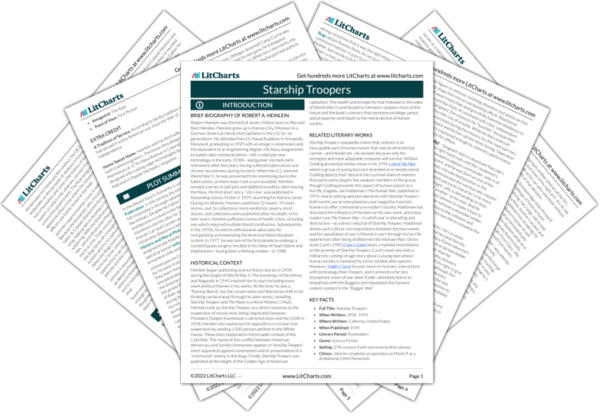Because of the way they protect and enhance the soldiers who wear them, the Mobile Infantry’s armored suits serve as a metaphor for the M.I. infantry itself. Soldiers make up a small part of the human population, but they serve to magnify and enact the decisions of the Terran Federation as they protect its citizens and legal residents and fight on their behalf. Likewise, the suits are only one part of what makes a cap trooper into a “one-man catastrophe”—their skills are developed by endless drills and exercises in everything from freezing still on command to hand-to-hand combat to simulated nuclear war. By utilizing “negative feedback and amplification,” the suits’ “pseudomusculature” responds exactly and immediately to the movements of the man wearing it, just as the M.I. soldier is trained to obey orders. Moreover, like nearly every soldier and officer in the M.I.’s lean hierarchy, the suits wear many hats: they’re armor, spacesuit, tank, and weapons cart. And even though the suits aren’t foolproof—many men still die wearing them—they keep enough soldiers alive in the Bug War for humanity to continue fighting for survival and dominance. In this way, the suits extend the soldiers’ efforts, just as the soldiers provide the “punch on the nose” that backs up the Federation’s decisions.
Suits Quotes in Starship Troopers
It’s better after you unload. Until you do, you sit there in total darkness, wrapped like a mummy against the acceleration, barely able to breathe—and knowing that there is just nitrogen around you in the capsule even if you could get your helmet open, which you can’t—and knowing that the capsule is surrounded by the firing tube anyhow and if the ship gets hit before they fire you, you haven’t got a prayer, you’ll just die there, unable to move, helpless. It's that endless wait in the dark that causes the shakes—thinking that they’ve forgotten you…the ship has been hulled and stayed in orbit, dead, and soon you’ll buy it, too, unable to move, choking. Or it’s a crash orbit and you’ll buy it that way, if you don’t roast on the way down.
There are a dozen different ways of delivering destruction in impersonal wholesale, via ships and missiles or one sort or another, catastrophes so widespread, so unselective, that the war is over because the nation or planet has ceased to exist. What we do is entirely different. We make war as personal as a punch in the nose. We can be selective, applying precisely the required amount of pressure at the specified point at a designated time—we’ve never been told to go down and kill or capture all left-handed redheads in a particular area, but if they tell us to, we can. We will.
We are the boys who go to a particular place, at H-hour, occupy a designated terrain, stand on it, dig the enemy out of their holes, force them then and there to surrender or die. We’re the bloody infantry, the doughboy, the duckfoot, the foot soldier who goes where the enemy is and takes him on in person. We’ve been doing it, with changes in weapons but very little change in our trade, at least since the time five thousand years ago when the foot sloggers of Sargon the Great forced the Sumerians to cry “Uncle!”
And that is the beauty of a powered suit: you don’t have to think about it. You don’t have to drive it, fly it, conn it, operate it; you just wear it and it takes orders directly from your muscles and does for you what your muscles are trying to do. This leaves you with your whole mind free to handle your weapons and notice what is going on around you … which is supremely important to an infantryman who wants to die in bed. If you load a mud foot down with a lot of gadgets that he has to watch, somebody a lot more simply equipped—say with a stone ax—will sneak up and bash his head in while he is trying to read a vernier.












